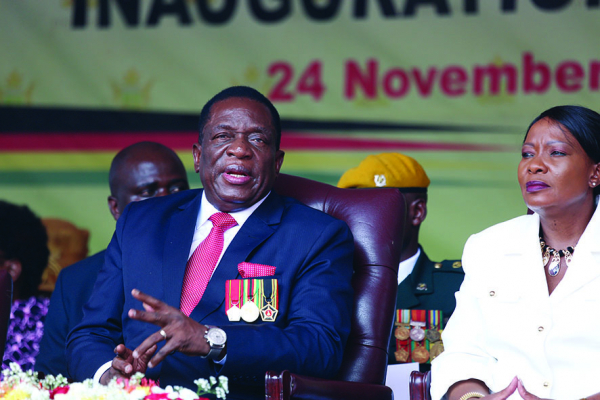
The good thing about the future is that it comes one day at a time. Since his inauguration last November, which attracted widespread jubilation, President Emmerson Mnangagwa has been on the right path in terms of political ideology and common resolve.
By Immigration Maziwisa
But despite the high approval he enjoyed in the beginning, tongues are beginning to wag in some circles.
Their optimism is about whether Mnangagwa can transform his verbal promises into tangible monetary outcomes.
The initial predicament Mnangagwa faces is that Zimbabweans have endured a protracted period of suffering under the previous leadership — they cannot wait another minute to experience the luxury of prosperity.
In that regard, their impatience is justified. What must be clear, though, is that Mnangagwa faces a very daunting task to revive a completely wretched economy, raise the spirits of scattered citizens, regain the trust of former investors and rebuild a once thriving country from scratch. In all fairness, that is no small task, especially under the current circumstances where time is not on his side.
In the midst of all the scepticism, notable progress has been made in some sectors.
For example, government’s recent order for ministers to declare their immovable assets is an indication that the President’s thoughts are in sync with contemporary expectations.
- Chamisa under fire over US$120K donation
- Mavhunga puts DeMbare into Chibuku quarterfinals
- Pension funds bet on Cabora Bassa oilfields
- Councils defy govt fire tender directive
Keep Reading
True prosperity is often driven by a collective sense of integrity. If 50% of the world’s wealth belongs to 1% of its population, it is possible for a few individuals to squander an entire country’s wealth.
All the more reason to ensure absolute accountability throughout the corridors of leadership.
In recent days, the President also ordered certain undisclosed individuals to return externalised public funds within 90 days or face prosecution. Without any particular bias or prejudice towards and against Mnangagwa respectively, the facts speak for themselves.
Mnangagwa has established a formidable sense of integrity within his first 60 days in office — a policy that his predecessor did not implement in nearly 38 years, not that the former President did not have his good days too — but that is a separate discussion.
Anyway, his active participation on the social media platform, Facebook and Twitter, is another gesture of engagement and a subsequent desire to address societal concerns.
These are very fundamental attributes of modern-day leadership, which are guided by the principle to “serve”.
Mnangagwa also promised to encourage a peaceful, free and fair election to be held by August 21 this year. He also declared to invite international observers to monitor them.
Quite frankly, Zimbabwe’s electoral history is one of disputed elections marred with alleged intimidation and violence.
The promise to invite international observers is praiseworthy and a noticeable indication that a new era is truly upon us.
In the end, the purpose of free and fair elections is to accord citizens the right to vote for a candidate of their choice.
The current President is promising a conducive environment for that process to occur and it’s a rare proposition in our lifetime. Despite his notable gusto and commitment to regain Zimbabwe’s lost ground in numerous faculties, the country’s challenges remain to be rectified. For example, ATM queues are still signalling an acute shortage of cash — though things have slightly improved in that regard.
The government has also been attempting to reorganise vendors, who are selling on the pavements to designated locations.
However, government’s efforts have been unsuccessful, as the vendors claim that the designated locations are not lucrative.
The vendors are determined to remain on the streets to exploit what they regard as their only source of revenue, in a country whose unemployment is towering. Among the forgotten glories is Zimbabwe’s infrastructure, which has now dilapidated to disgraceful levels.
During our days of prosperity, our beautiful roads and railway infrastructure and the splendid high-rise buildings in the capital, stood out competitively in Southern Africa.
I remember boarding a train from Rusape (my rural home) to Harare in my youthful days. The journey was unforgettable because the train’s interior was elegant and cosy.
Nowadays, the railway network requires a complete overhaul, so does agriculture and industry.
In any case, youth unemployment remains a depressing reality in the country and Mnangagwa faces stringent scrutiny in that regard.
Hospital facilities require an urgent inspection, as citizens now prefer to seek medical attention elsewhere.
In the fullness of time, Zimbabweans should seek medical attention locally.
Praiseworthy, though, is the development that the elderly, pregnant women and infants are now entitled to receive free medical cover from government hospitals. Although there is more to be done, it is a good start.
Despite the mighty contributions by Mnangagwa, several challenges continue to grip the country.
In the midst of those predicaments, hope lingers in the hearts and minds of all and sundry.
It is also imperative to note that Mnangagwa did not cause the current economic depression in our country, his commitment is only to fix it. Under these circumstances, such a wretched country requires sufficient time to transform and return its glory days.
The ultimate value in Mnangagwa is his noticeable intention to turn the fortunes around — and his sincerity in doing so.
What Zimbabweans must refrain from though, is the culture of hero-worshipping and dividing a united people.
The most ideal scenario would be a culture where leaders are praised when they advance the common good of citizens and held to account when they do not. It’s a basic modern-day principle. Immigration Maziwisa is a political analyst and social commentator. He writes in his own capacity. He can be contacted on [email protected]











